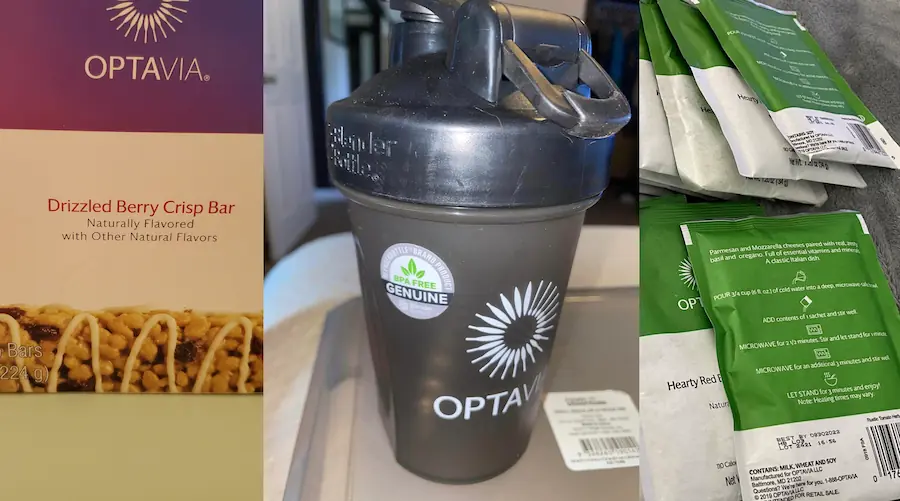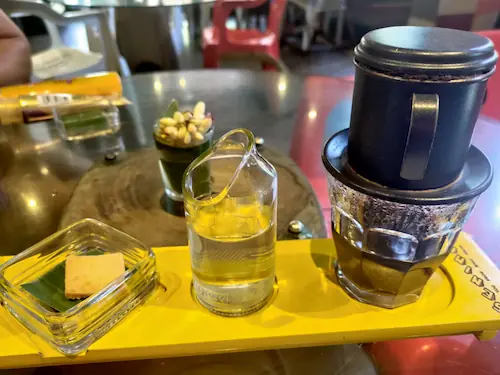Many people make the switch to healthier diets, such as cutting out sugar, and alcohol, especially when following the Opatvia plan.
However, I know from experience this change in diet can lead to unexpected consequences like constipation, bloating, and gas.
This, of course, can be due to a variety of reasons. Here are three common causes and how to solve them with dietary changes.

First, let’s talk about constipation and weight loss
Constipation is when bowel movements become difficult, infrequent, or completely stopped, and it’s one of the potential Optavia side effects.
The American College of Gastroenterology defines constipation as having fewer than three bowel movements per week; however, this can be considered normal depending on the person.
Symptoms may include:
- Unsatisfactory defecation
- Infrequent stools
- Difficulty in stool passage
- Straining when having a bowel movement
- Abdominal pain and bloating
I used to assume that this is just caused by their diet, but there are in fact a number of different causes.
Medications like painkillers, antidepressants, and antibiotics can contribute to constipation for example.
Health conditions such as irritable bowel syndrome or hypothyroidism also play a significant role in the development of bowel issues.
Why do I always get constipated?
I must confess – every time when I start a new diet that restricts my food intake in one form or another, I get constipated.
I don’t have any underlying medical conditions and I don’t take any medication.
And yet, when I try a new diet (usually low-calorie) diet, my tummy gets uncomfortable and I can’t poop easily.
It doesn’t hurt, but it feels frustrating.
So why do I always get constipated when trying a new diet?
According to the article published in the Nutrients Journal, “the food we eat can trigger constipation and affect how well we can go to the bathroom.”
Eating too much or too little can make it harder for us to poop, states the journal.
The study also highlights that drinking enough water is important, too.
Why?
“When we don’t drink enough water, it can make it harder for us to go to the bathroom.”
I have noticed that when I don’t eat enough fiber or drink enough water, it’s harder for me to poop.
I get constipated and it’s uncomfortable.
What’s more, the study also has shown that “lower constipation scores appeared to be related to grains, lipid-rich foods, total fats, and starch.”
On the contrary, “higher constipation scores showed a correlation with sugary products, sodium, and higher energy intakes.”
Does the Optavia diet cause constipation?
Yes and no.
On the one hand, the Optavia diet does not necessarily cause constipation as each of the Fueling contains 4-5 grams of dietary fiber.
The Centers for Disease Control and Prevention (CDC) recommends that adults should aim to eat 22 to 34 grams of fiber every day, but the exact amount you need may differ based on your age and gender.
Assuming that you consume five Fuelings per day and one lean and green meal as recommended by the 5 and 1 plan, you should be getting a good amount of fiber.
However, that’s not always the case, as I’ve explained in my article about Opatvia and fiber.
My experience wasn’t so positive when I followed the Optavia program.
I found that cutting out certain food groups like starches and grains, as well as reducing my calorie intake below 1,000 kcal per day, caused me to become constipated quickly.
So what did I do?
I’ve moved over and started to look for alternatives to the Optavia diet.
Here’s a photo of my lean and green meal that is geared towards preventing my constipation.

Sure, it does have white rice, which is not really “approved” by 5 and 1 guidelines.
However, I found that adding back rice (or other grains), vegetables, and fruits on the side helped to prevent constipation.
How can I stop constipation on Optavia?
Let’s talk about constipation relief.
If you’re following the Optavia diet to the letter, but still experience constipation, there are other methods you can try to reduce symptoms.
Add more fiber from vegetables
First, let’s understand the different types of fiber.
Although Optavia Fuelings include plenty of fiber, this fiber is not natural.
It is known as “added fiber”, or “functional fiber” which is a synthetic fiber that is added to foods or supplements.
While functional fibers can perform some of the same functions as dietary fiber, like aiding digestion and promoting satiety, they’re not a perfect replacement for the naturally occurring fiber found in whole foods.
Many foods that have functional fibers added to them are highly processed and lack the vitamins, minerals, and other beneficial nutrients associated with high-fiber foods.
So what can you do?
Start by adding more greens to your lean and green meal, or which 1-2 Opatvia fuelings for healthier DIY alternatives.
Drink more fluids
Staying properly hydrated is one of the keys to maintaining good health, and it’s especially important for regular bowel function.
When enough water isn’t consumed, the body compensates by drawing on water from the colon.
This means there’s less left over to lubricate stool as it passes through which can cause constipation.
As you can see, drinking more fluids is essential when trying to prevent constipation on the Optavia diet.
So which fluids should you choose?
If you’re getting bloated and constipated, I would start with spring water or mineral water.
To stay hydrated throughout the day, aim for at least 8 glasses of water.
On the contrary, I would stay away from too much caffeine and diet soda as they may contribute to bloating and discomfort.
What to do if you like coffee?
Simple.
Here’s a photo of my wife’s coffee she orders at our local coffee shop in Coral Gabels.

On your right, you have a filter coffee, and in the middle an additional glass of water.
Although this glass is only small, it helps to maintain some level of hydration.
Move your body
Although Optavia doesn’t endorse physical activity during their 5 and 1 plan, exercising regularly can help with digestive health.
According to the Scandinavian Journal of Gastroenterology, “aerobic exercise had a positive effect on constipation”.
The journal also points out that regular exercise can help address several potential causes of constipation.
How?
Increasing activity encourages your bowels to get moving. This can aid in relieving digestive troubles by adding regularity to your bowel movements.
Even something as simple as a lunchtime brisk walk or taking the dog for a walk after dinner can make a huge difference in managing constipation issues.
Avoid constipating foods
For me, the easiest way to prevent constipation is to avoid certain foods that can trigger it.
Here’s a short list of foods to stay away from if you’re trying to avoid constipation:
- Refined grains like white bread, cereal, and pasta
- Processed snacks like chips and cookies
- Dairy products like cheese or ice cream
- Red meat
- Fried foods
I talk a lot about which foods to stay away from in our newsletter. So if that’s something you want to learn more about, sign up below.
Should I keep doing Optavia even if I’m constipated?
It is understandable to feel discouraged if you’re experiencing constipation while following the Optavia diet.
That said, it doesn’t necessarily mean that the diet isn’t working for you or that you should give up on it altogether.
Making minor adjustments to your routine and lifestyle can help manage your symptoms and even help prevent them from occurring in the first place.
The previously discusses strategies like adding more fiber-rich foods, drinking plenty of fluids, exercising regularly, and avoiding constipating foods can be effective ways to address the issue.
If you’ve made these changes and your symptoms persist, consult with your doctor or a dietitian for additional advice.
Does Optavia cause bowel issues?
No, Optavia does not cause bowel issues and any constipation experienced is likely due to individual dietary choices.
Eating foods high in fiber, staying hydrated, exercising regularly, and avoiding constipating foods can help prevent constipation while following the Optavia diet.
Do doctors recommend Optavia?
While Optavia does provide some health benefits, it is not necessarily recommended by doctors for constipation.
It is important to speak with a doctor or dietitian to discuss any underlying issues that may be causing your symptoms and work together to develop an individualized plan of action.
The bottom line
Constipation is a common issue that can occur when following the Optavia diet plan.
Fortunately, there are several lifestyle and dietary adjustments that can be made to help manage and prevent constipation.
It is important to drink plenty of fluids, exercise regularly, avoid constipating foods, and ensure you are getting enough fiber-rich foods in your diet.
If symptoms persist despite making these changes, it is important to speak with your doctor or a dietitian for additional advice.
